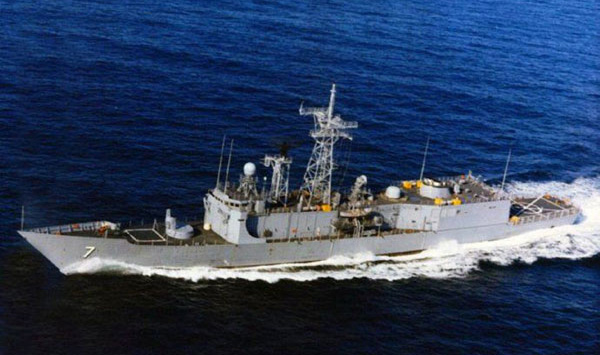 |
|
The photo shows an Oliver Hazard Perry class frigate. [File photo] |
The US has decided to sell another round of $1.83 billion arms sale package to Taiwan, again despite the Chinese mainland's persistent opposition. The US sale of weapons to Taiwan has been a sticking point in Sino-US relations for decades and it's time Washington stopped undermining the most important bilateral ties in the world.
The sale of weapons to Taiwan is a legacy of the Chinese Civil War and the Cold War. The US emerged from World War II as the most powerful nation, with about 75 percent of world's gold, 50 percent of the world GDP and the lethal nuclear bomb. Intoxicated by its military might , the US started dictating terms to other countries and, in the process, earning the wrath of many people across the world, including the Chinese.
The US, after WWII, changed its policy of not interfering in other countries' internal affairs on the pretext of fighting communism. It entered the Korean War (1950-53) in order to "change" the outcome of the Chinese Civil War, and to stop the advance of communism in Asia. In the end, it lost.
Refusing to learn any lesson from its losses in the Korean War, the US stumbled into the civil war in Vietnam. Ten years later, it was humbled, despite its military might, by the resistance of the Vietnamese people. As an increasing number of Americans rose to oppose, and the anti-war movement spread across other countries, the US finally withdrew from Vietnam with heavy casualties. The Vietnam War left a deep scar in the American psyche, referred to by former US president, George H.W. Bush, as the "Vietnam Syndrome".
But in spite of the losses suffered in Asia since the Chinese Civil War, American politicians didn't change their policy of interference. They refused to accept the reasons why the US suffered heavy losses and were humbled in Asia. The Americans didn't succeed in their designs not because they did not have a powerful enough military but because they lost the moral high ground.
Being a former colony, the US' foreign policy was designed to be anti-colonial in nature. During World War I, former US president Woodrow Wilson advocated self-determination for the people of British and French colonies. Another former US president, Franklin D. Roosevelt, despite being an ally of Britain in WWII, opposed former British prime minister Winston Churchill's colonial policies.
However, Harry S. Truman, who succeeded Roosevelt as US president, betrayed the American tradition and began supporting the France and Britain to maintain or regain control over their former colonies. This turned the entire "Third World" against the US.
American interference in other countries' internal affairs has cost the US dear. The US has lost the respect and goodwill of the oppressed people of the world, and its interference in other countries' affairs has drained its coffers. Once the wealthiest nation in real terms and the most loved country in the world, the US today has the biggest national debt, of more than $18 trillion.
Occupying the moral high ground is crucially important for any major world player. Without it, no country can hold its place for long. And the best way of seeking the moral high ground is to do the right thing and help others.
But the US has no room from such ethical matters, although its insistence on selling weapons to Taiwan is fraught with dangers. The Chinese people and government will view the US' action as hostile and aimed at challenging the country's territorial integrity. And this will have consequences.
The US has been talking about "rebalancing to Asia". But the most urgent rebalancing act for the US to do is to stop selling weapons to Taiwan.
The author is a professor at Warren Wilson College, North Carolina, and a guest professor at Hebei University.
The opinions expressed here are those of the writer and don't represent views of China Daily website.